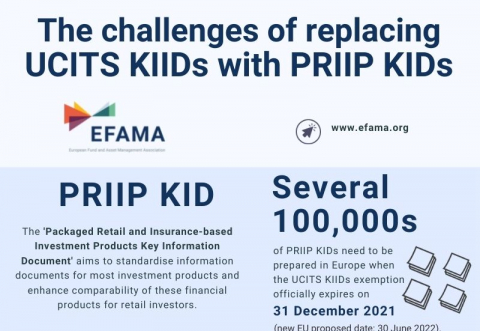EFAMA (European Fund of Asset Management Associations) and ICSA (International Council of Securities Association) published today a Global Memo on Benchmark Data Costs, identifying the main challenges arising from the increased use of benchmark data over recent decades and the imposition of increasingly complex and ove
EFAMA welcomes proposed transitional period under Art. 8 of the taxonomy and calls for its alignment with SFDR taxonomy-related product disclosures
EFAMA has published its response to a consultation on the draft delegated act under Article 8 of the Taxonomy.
European Statistics Q1 2021 | European Investment Fund Industry 2021 Trends - Equity funds reach all-time high
EFAMA has today published its Investment Fund Industry Fact Sheet for the first quarter of 2021, including information on owners of investment funds in Europe and their net purchases of funds during the fourth quarter of 2020.
The main developments through the quarter are as follows:
Pre-order your copy of the 2021 Fact Book!
EFAMA’s 2021 Fact Book, “Trends in European Investment Funds”, will be published at the end of June.
As in previous years, this year’s Fact Book provides an extensive analysis of key developments in the investment fund industry, inside and outside Europe.
EFAMA calls for better synchronisation between Level 1, 2 and 3 acts
EFAMA has published its response to the European Commission’s targeted consultation on the supervisory convergence and the Single Rule Book, focusing on three areas for improvement.
Monthly Statistics March 2021| UCITS net assets increase 5.6% in first quarter to EUR 12.4 trillion
The European Fund and Asset Management Association (EFAMA) has today published its latest monthly Investment Fund Industry Fact Sheet, which provides data on UCITS and AIFs sold in March 2021, at European level and by country of fund domiciliation.
EFAMA calls for consistency of taxonomy KPI metrics in EU sustainable finance regime
EFAMA has published its response to the joint European Supervisory Authorities (ESAs) consultation on taxonomy-related sustainability disclosures in the Sustainable Finance Disclosure Regulation (SFDR).
EFAMA's reply to IASB's Request for Information on the Post-implementation Review (PIR) of IFRS 10, 11 and 12
EFAMA replied to IASB’s Request for Information on the Post-Implementation Review of IFRS 10, 11 and 12. We are delighted to see an investment entity within the funds industry being acknowledged and catered for in IFRS. The development of the consolidation standards was a very welcomed development in the asset management world.
Infographic | The challenges of replacing UCITS KIIDs with PRIIP KIDs
In support of our call for additional time to implement the PRIIPs rules, we have produced an infographic that summarises the challenges our members face replacing UCITS KIIDS with PRIIP KIDs. The infographic shows the many entities involved in the process and the steps required to prepare a PRIIP KID. Feel free to make use of this infographic.
Monthly Statistics February 2021| Demand for long-term UCITS remained strong in February
The European Fund and Asset Management Association (EFAMA) has today published its latest monthly Investment Fund Industry Fact Sheet, which provides data on UCITS and AIFs sold in February 2021, at European level and by country of fund domiciliation.
EFAMA's and ICMA’s AMIC joint response on fund liquidity management by open-ended funds to IOSCO
ICMA’s AMIC and EFAMA have submitted a joint response to the IOSCO consultation on fund liquidity management by open-ended funds.
The response highlights how industry practices and existing regulatory provisions in Europe are well aligned with the Liquidity Risk Management (LRM) recommendations issued by IOSCO in 2018 (Annex 1).
EFAMA calls for prompt adoption of ambitious mandatory sustainability disclosures under the Corporate Sustainability Reporting Directive
The European Commission has published a proposal for a Corporate Sustainability Reporting Directive (CSRD), paving the way for much-needed mandatory European sustainability reporting standards (ESS). Insufficient availability of meaningful, comparable, reliable and public ESG data is a key impediment to realising the full potential of the EU's sustainable finance regulatory framework. EFAMA, therefore, encourages the co-legislators to maintain the ambition of this proposal.



































